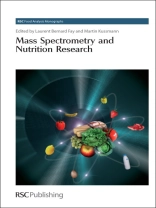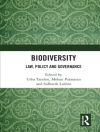Mass spectrometry has developed into a platform for the assessment of health, sensory, quality and safety aspects of food. Current nutrition research focuses on unravelling the link between acute or chronic dietary and nutrient intake and the physiological effects at cellular, tissue and whole body level. The bioavailability and bioefficacy of food constituents and dose-effect correlations are key to understanding the impact of food on defined health outcomes. To generate this information, appropriate analytical tools are required to identify and quantify minute amounts of individual compounds in highly complex matrices (such as food or biological fluids) and to monitor molecular changes in the body in a highly specific and sensitive manner. Mass spectrometry has become the method of choice for such work and now has broad applications throughout all areas of nutrition research. This book focuses the contribution of mass spectrometry to the advancement of nutrition research. Aimed at students, teachers and researchers, it provides a link between nutrition and analytical biochemistry. It guides nutritionists to the appropriate techniques for their work and introduces analytical biochemists to new fields of application in nutrition and health. The first part of the book is dedicated to the assessment of macro- and micro-nutrient status with a view to making dietary recommendations for the treatment of diet-related diseases. The second part shows how mass spectrometry has changed nutrition research in fields like energy metabolism, body composition, protein turnover, immune modulation and cardiovascular health.
Jadual kandungan
Chapter 1: Mass Spectrometry Technologies;
Chapter 2: Mass Spectrometry for Food Analysis: The Example of Fat Soluble Vitamins A and K;
Chapter 3: Mass Spectrometry for the Analysis of Milk Oligosaccharides;
Chapter 4: Mass Spectrometry in Protein, Peptide and Amino Acid Analysis;
Chapter 5: Lipidomics and Metabolomics of Dietary Lipid Peroxidation;
Chapter 6: Mass Spectrometry in Phytonutrient Research;
Chapter 7: Addressing Health Beneficial Aspects of Nutrition – The Example of the Obesity Epidemic;
Chapter 8: Mass Spectrometry, Diet and Cardiovascular Disease: What Will They Mean for Food?;
Chapter 9: Nutrition and Immunity;
Chapter 10: Mass Spectrometry, Nutrition and Protein Turnover;
Chapter 11: Conclusion
Mengenai Pengarang
Prof. Dr. Martin Kussmann leads the Functional Genomics Group at the Nestlé Research Centre and is Honorary Professor at the Faculty of Science, Aarhus University, Denmark. His team at Nestlé is responsible for Nutrigenomics and Nutrigenetics. They develop and integrate gene and protein expression profiling with bioinformatics and computational molecular science. Major application fields are immunology, diabesity, and digestive health. Being educated as an analytical biochemist, Prof. Kussmann has acquired research experience in the pharmaceutical (Pharmacia-Upjohn/Sweden, Cerbios-Pharma/Switzerland), biotechnological (Prof. Dr. D. Hochstrasser, Gene Prot/ Switzerland) and nutritional (Nestlé) industry. Prof. Kussmann holds a M.Sc. and a Ph.D. in Chemistry, obtained at the Universities of Aachen and Konstanz, Germany, and at the University of California, San Francisco, USA (Prof. Dr. A. L. Burlingame). During his doctorate and post-doctorate (Prof. P. Roepstorff, University of Southern Denmark, Odense), he has specialised in analytical biochemistry, proteomics and genomics. Prof. Kussmann has co-authored 50 peer-reviewed publications, has edited books and journal issues, and is an internationally requested author and speaker. He is a member of the ASBMB (Am. Soc. Biochem. Mol. Biol.), DGMS (German Soc. Mass Spectrom.), Nu GO (European Nutrigenomics Organization), SGMS (Swiss Soc. Mass Spectrom.) and SPS (Swiss Proteomics Soc.). He is an Editorial Board Member of the Journal of Proteomics; The Open Journal of Proteomics; Proteomics Insights; and Endocrine, Metabolic and Immune Disorders – Drug Targets (EMID-DT).












